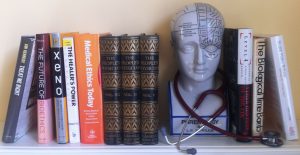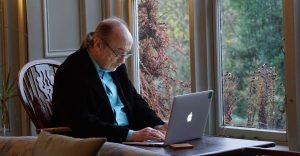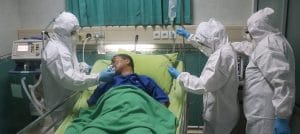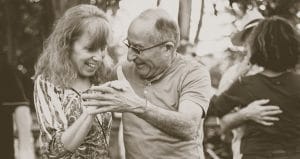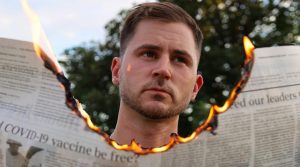How has increasing workload impacted on GPs, and our sense of providing safe care to our patients? Nada Khan finds that research into workload and safety suggests an association between wellbeing, burnout and patient safety.
Primary care clinicians need to be confident business and healthcare management leaders soon after qualification. It's about time this becomes an educational priority to those with the power to shape the educational future of general practice.
Samar Razaq reflects on truth, medical opinion and the scholarship in the age of Twitter.
Matthew Davis and Ana Worthington argue that the arguments in favour of the recent Assisted Dying Bill at its second reading in the UK House of Lords are based on flawed evidence
Helen Burn explains that because legalised physician-assisted dying would likely involve GPs, GPs should think about their views on the issue.
Felicitas Selter, Kirsten Persson, and Gerald Neitzke discuss the similarities and differences in animal and human euthanasia as a source of moral distress for the practitioner.
Andrew Papanikitas, Peter Toon, Paquita De Zulueta, David Misselbrook and John Spicer launch the Ethics of the Ordinary column and reflect on the field of primary care ethics and its relevance
Basem Saab and colleagues from the American University of Beirut illustrate the complexity of COVID-19 requirements and air-travel, for which patients may attend their family doctor for advice and documentation.
Jason Heath, Sangeetha Sornalingam, and Max Cooper highlight the problems the #newnormal is causing to medical education and argue that recognition of this effect is needed before there is lasting damage to the future of the medial profession
What comes to mind when you hear the word bully? Most likely the stereotype of an older child picking on a younger child. But it's important to think of other forms, like the bullying that occurs in our workplaces. Joel Brown explores
As a practising GP, I have come to see myself as a fixer of problems. But does this problem-oriented approach to consultation squander the opportunity we have when we engage our patients in that narrow window? What if we were to re-configure
Louise Hyde argues that we could be doing a lot more to protect children from COVID in the UK
Gwenllian Wynne-Jones and Carolyn Chew-Graham outline the societal and personal impacts of supporting people back to work, and the effective role of primary care in the UK
The breadth of the scope of clinical care in general practice has often left the rather tragically lingering stereotype that GPs are the medical variety Jack of all trades and master of none. Joel Brown, family physician, combats this stereotype and offers
Maybe the human connection be used as a strength when it comes to health motivation. Mariam Sohail is inspired by a new father.
Lloyd Hughes looks at plans for an integrated Scottish National Care Service and considers the strategic challenges for general practice it poses.
We all live in our bubbles. These are where we live our versions of reality and avoid anything that might harm them. Our habitable biosphere on Earth is a bubble. Inside are the smaller bubbles that include our family, beliefs, habits, work,
Jack Monahan reflects on an elective in homeless medicine and reminds us that general practice can help address the cumulative disadvantages that put a person on the street.
Richard Armitage takes a critical look at the shift to offering more urgent than planned general practice appointments, and finds it is a complicated trade off between competing priorities
Stephen Opare-Sakyi argues that GPs should see patients as whole people, but should be seen as whole people as well - by governments, patients, and each other.
John Launer muses on what Mozart's Magic Flute can teach us about family medicine
Arthur Kaufman reflects on intergenerational tensions from the older British citizen's perspective. It is easy to see these being implicit or even explicit in the consultation.
Richard Armitage argues that COVID-19 booster campaigns are a golden opportunity for health promotion, which could decrease COVID-19 effects and have wide benefits as well. Commissioners take note!
Consultations about relationships prompt Bhupinder Goraya to reflect on the consultation relationship - could 'beginner's mind be the answer?'
Austin O'Carroll argues that the label of personality disorder is inappropriate and harmful to patients who have suffered adverse social environments in childhood. By simultaneously ignoring social causation and denying the possibility of therapy the diagnosis perpetrates a systematic injustice against those
As notice-boards overflow with helpful advice, are we entering an age of extreme wallpapering? Madge McClary argues we should stem this tide for the sake of all!
As workload pressures squeeze the consultation times, Rubia Usman writes an open letter asking patients to remember that their GP is human too
Media images of mask-wearing healthcare staff rarely depict primary care. A facet of the existential crisis facing general practice is that of identity. As it stands, it feels as if GPs have been judged in pseudo-absentia. Sati Heer-Stavert calls us all
Over the last 18 months, anyone with any opinion, be it a politician or a journalist, has had something to say about general practice. Samar Razaq considers the roller coaster ride of unreason.
Yvette Pyne has taken a tour of the beautiful city of Paris just before Christmas. No, not the Avenue des Champs-Élysées and shopping, but refugee squats as a medic for a charity providing medical assistance to asylum seekers in France.
'Knowledge work' is the work that clinicians do to find, create, and use knowledge in everyday clinical practice. Annabelle Machin and her colleagues explain the role of the WISDOM project.
Are we now facing increasing discrimination and prejudice against the elderly? Madge McClary speaks out for a generation.
Generally speaking, we like to consider medical practice as a matter of hard science rather than opinion. Bhupinder Goraya also invites us to treat disagreement with kindness.
Increasing money and training to refuel our weakening and unstable NHS healthcare workforce may be necessary, but it is certainly not sufficient. David Zigmond tells us why.
The Financial Times appears to suggest that family doctors may no longer be needed. Nick Berry probes the realities behind the headline.
The last 2 years have demonstrated that disease and mortality does discriminate by postcode, but some argue the ‘inverse care law’ is an ideological stance rather than a medical issue. Daniel Butler and Nigel Hart add to the debate over the question
Have you ever looked at a cloud and seen the likeness of a cartoon character? This phenomenon is known as pareidolia. Laura Amarin and Camille Gajria tell us about pareidolia in medicine.
How many times a day are we hearing the ‘R’ word in our lives? The request of healthcare staff to be r*******t at a time when primary care is assaulted daily by the British media and those in power is an insult.
Hannah Milton shares her experience of compassion fatigue following being both a mum and a GP at the same time. She shares how she not only recovered, but how her recovery has left her now better able to empathise with patients.
The climate and ecological emergency is nothing less than the biggest challenge humanity has ever faced. With the meat industry being the world's largest producer of greenhouse gases could the best option to save our planet be the mass transition to a
Giles Hazan reflects on his experience of high dose opiates following surgery.







